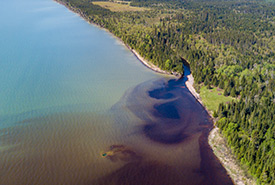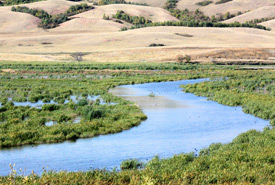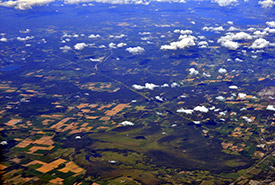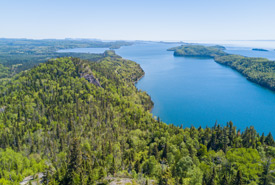Why Canada needs to be a global leader in the protection of fresh water

Black Bay, Lake Superior, ON (Photo by Costal Productions)
It’s a luxury to not think about water.
Most Canadians watch it flow from the faucet and go down the drain without considering its source or destination. When we do think about water, it’s only about where the nearest tap is.
Many people in the world don’t have taps. Over 1.2 billion people experience critical water shortages. They think about water every day.
Rapid climate change is going to change the way Canadians think about water. And we are going to think about it a lot more.
While scientists can’t predict every future impact of climate change, there are many impacts that we are already experiencing. And most of those involve water.
It’s not my grandma’s weather anymore. Climate change has altered how, where and when we receive rain and snow. There is more variation in rainfall amounts, with some regions getting a lot more and some a lot less. We are also seeing more extreme rain events, with a month’s worth of rain falling in just a few hours. My kids have already experienced several one hundred-year storms.
Unfortunately, it sometimes takes a disaster to make us rethink our relationship with water — and water has some very effective ways of communicating with people. Floods, droughts and polluted water that makes people sick sends a strong message.
Slow the flow

River in Fairy Hill, SK (Photo by Carmen Leibel)
Here’s our problem. For over 200 years in Canada, we have tried to move water off the landscape as quickly as possible by straightening streams and filling floodplains. But draining the landscape has caused profound changes to the ancient interactions between water and land. In the past, rain and snow melt would slowly infiltrate into aquifers or streams, or meander through roots, stems and leaves to return to the atmosphere. Now we push water along hard, straight lines where the benefits of interacting with soil and plants are lost. Instead of water being cleaned, it is contaminated with too many nutrients and sediments. Instead of a gentle, steady release of water into streams, we force it quickly through engineered waterways that rise and fall like a toilet being flushed.

Aerial view of Minesing Wetlands, Ontario (Photo by John Mabel)
We need to slow the flow. Retaining and restoring wetlands and floodplains are a critical part of our adaptation to rapid climate change. These habitats provides a two-for-one return on investment when it comes to climate change: they increase landscape resilience to extreme weather by holding flood waters and filtering pollution, and the conserved spaces help to capture and store carbon pollution from the atmosphere. These places also provide habitat for wildlife and opportunities for Canadians to connect with nature.
We are a nation that is rich in fresh water. Canada has approximately 25 per cent of the world’s wetlands by area, and we have more lakes than the rest of the world combined. But our freshwater endowment is at risk, especially in southern Canada, where most Canadians live. Loss of wetland and floodplain habitats, and run-off from our cities and farms, is impacting our lakes, rivers and streams. And this impacts us all.
The Nature Conservancy of Canada is helping protect wetlands, floodplains and other places that are important for nature and for people. We work with willing private landowners who donate or sell their properties or place them under a long-term conservation agreement. This conservation work is supported by Canadians, businesses, foundations, various provincial governments and Environment and Climate Change Canada’s Natural Areas Conservation Program.
Water is sending us a message. A healthy natural environment is a key part of the infrastructure for our cities and communities. Canada has an opportunity to lead the world in showing how nature conservation supports clean water, climate change adaptation and our well-being.

Big Trout Bay, Lake Superior, ON (Photo by Costal Productions)
Just as we need to invest in pipes and pumps as a part of our water system, we also need to invest in healthy wetlands, rivers and watersheds to ensure a future of clean and abundant fresh water.
If we think about water a little more today, maybe future generations will need to think about it a little less.


